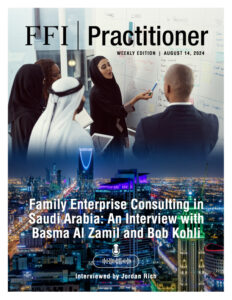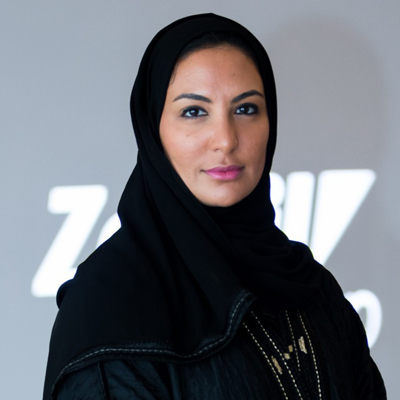
View this edition in our enhanced digital edition format with supporting visual insight and information.
FFI Practitioner is pleased to feature Basma Al Zamil and Bob Kohli for a podcast conversation about family enterprises and family enterprise consulting in Saudi Arabia. In this podcast, Bob and Basma discuss the evolution of family enterprises in Saudi Arabia and the wider Gulf region since the 1960s, the current focus on the implementation of governance, and suggestions for advisors new to the region.
Podcast Transcript
Jordan Rich (JR): Welcome to the FFI Practitioner Podcast. My name is Jordan Rich, and I’m very grateful to have with me today Basma Al Zamil and Bob Kohli for a conversation on family enterprises and family enterprise consulting in Saudi Arabia. Basma is one of the first female family members to work in her family’s enterprise and is also a family enterprise consultant working with women who are part of family enterprises in the Middle East. Bob has nearly two decades of experience as a global advisor and a consultant to multi-generational family enterprises. He focuses on long-term strategic planning, governance, conflict resolution, and succession planning. Let me start with Basma to please comment on how things are changing in Saudi Arabia when it comes to family enterprise.
Basma Al Zamil (BA): Talking about Saudi Arabia and the evolution of family businesses, we can say that it began in the late ‘60s, when oil was discovered. This is where all the challenges and the opportunities for families began. They were pioneers. They believed that there was a change in Saudi and that they had to set their foot in this change. In the mid ‘70s, a lot of Saudis came back from abroad. They came back to Saudi with opportunities, and that was when the families started their family businesses. I can say the start of family businesses in Saudi began in the ‘70s. Today, most of the family businesses are in their transition from second to third generation. If I talk about my family, this is our transition today. It is really the most challenging time of any family business, the transition from the second to third generation.
JR: Let me ask you to comment as well, Bob, since you work in this area exclusively and proficiently, describe the atmosphere and describe the culture and conscience of family business in Saudi Arabia.
Bob Kohli (BK): I think that’s one of the things that we really wanted to do here, Basma and I—to give people a sense of Saudi Arabia as an example of the region itself, the Gulf region. Saudi Arabia in and of itself is the largest economy in the Middle East at almost two trillion dollars GDP. It has one of the highest per capita incomes, which means that it is one of the richest countries as well.
When people think about this region, they think, “Oh, it’s about oil.” That’s more a story of the past for Saudi Arabia and the region. In the last couple of decades, a lot of the countries here in the region have invested heavily in industrial manufacturing and tourism in several sectors, and they’ve really diversified their economies. The markets are quite well capitalized. They’re well developed. They’re profitable. There’s business reform as well, which has really attracted a lot of foreign capital and foreign talent. The economic outlook as well, by all indicators, is that the region is set to outpace global GDP. The sentiment is really high. It’s an incredibly dynamic region.
And at the center of it is family business. When you think in the US and in the West, when you think about the big business names, you’re not always thinking about family business. In Saudi Arabia and the wider Gulf region, business is dominated by family business. The names are iconic family businesses, and they’re well regarded by the local populace. They’re diversified conglomerates. They’re standalone family businesses. In total, 80% of the local labor force is working for a family business. They really are the center of the economy across all sectors, not just oil and gas. Construction, retail, automotive, transportation, healthcare, education, every sector you can think of, there are dominant family business players here. Looking at the landscape—[in the Gulf region] $1 trillion is set to transition, change hands from one generation to the next, the G2 to G3 transition, in the next decade or so.
BA: This is the place to be if we talk about family businesses, either if we talk business and money or if we talk about governance and the transition and sustainability of family businesses. The government itself is worried about all of the family businesses, and they want to have this transition to happen in the best way possible. That’s a very important period for Saudi, and we can see even in the biggest family businesses, there are a lot of sectors that the government is actually buying because they want to be sure that they are sustained and that they have the best future.
BK: I think the public sector, the governments have taken such a keen interest in family businesses here in the region. Also, in speaking with our local colleagues in this region, the governments are more active in family business than any other region in the world. There are laws being passed to support the implementation of governance and long-term sustainability in family businesses. There are educational programs—the local chambers of commerce whether in Dubai or Saudi Arabia, they are so active in promoting education and promoting sustainable efforts in family businesses, and the government is pushing this because they realize how critical family businesses are to the economy. And let’s be honest, there have also been a couple of scary cases as well with family businesses here. That’s kind of been the trigger for a lot of this happening, but it’s happening and it’s happening really fast. It’s a very dynamic region.
JR: I’d like to know from each of you, and we’ll start with you, Bob, and then go back to Basma, the misconceptions that those of us in other parts of the world have about how a family business operates and works and does due diligence and governance in Saudi Arabia. What are those basic misconceptions that we want to point out?
BK: I’ll tell you generally a little bit about conceptions, at least how I feel about family businesses, comparing them to family businesses in the US, Japan and Europe. Family businesses over here are relatively young. As Basma said, they’re G1, G2, G3, it’s very rare to go G4 and beyond. There are family businesses that are older, of course, but they’re very few. In terms of a landscape, it’s a younger landscape. Therefore, the questions that you’re often dealing with are more foundational questions on governance and the foundations of governance. I think Basma can talk a little bit more about the misconceptions.
BA: Whenever you are really on foot here in the region, you will see something different. The first thing I believe, visiting the region, being with the people here, attending all of these family business events that are happening here in the region—every month there is one of these events. I think this is the best way to understand and to know what’s happening in the region. This will be my first advice for anybody who wants to be able to understand the region: meeting the people, knowing what they are thinking about, I think it’s the most important thing. The second thing that they have to know is to ask more and seek advice from the people who have worked here, either businessmen or advisors who worked with the family businesses. Both will give them the real picture about what is happening here in the region.
BK: In the end, what you will find is that, yes, family businesses over here are unique because of their cultures and traditions. In and of themselves, the challenges are still the same. There are multiple generations within the business. The families do tend to be slightly larger here in the region than they do in other regions. By the third generation, you’re looking at several branches already that you have to deal with, so the complexity is quite deep. The government structures are underdeveloped. The families are still figuring out the meaning of governance. In terms of misconceptions, getting back to that point, I think the one big misconception is that things are a lot more advanced over here than they seem. I think that family businesses over here in the region tend to be quite private. That’s actually a nuance in the region. There’s a lot of privacy. People are cautious. Trust is hard to come by. But when you peel back in the layers of the onions, you begin to find out people actually know a lot more than they realize. They are doing a lot more than even you realize! And that would be one misconception. I think they’re actually quite more advanced than people think. But yes, there’s a long way to go. The region is still young.
JR: Basma, let me go to you with this next question, because patriarchy has existed across the world, including here in the West. The fact that men have been the heads of the families, the heads of the governments, et cetera, et cetera. We’re seeing that change all over the world. And the mere fact that I’m talking to you about this suggests that it’s changed in Saudi Arabia. Reflect a little bit on the change and how it’s affected women in Saudi Arabia.
BA: Sure. Talking about all of the change that has happened in Saudi in the past couple of years. In other countries, it took about a century. So for us as Saudis, I think we were ready for this change. But really, we wanted the best time. I can say, our background is really to follow what the rulers say. So when the rulers gave us the green light to begin working and to begin giving back, I think every woman in the region was ready for that. Even the businesses, they were ready. So you can see the changes have been made easily, fast, and everybody is happy about it. And they were really excited about it. You can see that there is a lot of women who are now our top leaders. I can talk about myself: I was the first female to join the family business. The family business was there for 80 years with no females joining. For me to be the first female, and in six years, I was the head of HR. And you’re talking about more than 4,000 employees. I can say it’s a dream come true for every woman in Saudi Arabia. Now you can see in Saudi, there are all of these changes that are important. If we go to the other hand and talk about family business, it’s important for every female family member to understand more about their businesses. What will they go through and what’s their future? Again, this is a challenge for every female family member.
JR: Bob, how has this impacted the work you do? The fact that women are now stepping up and are part of the family governance structure like never before in Saudi Arabia, and in other countries, quite frankly. What does it mean to you as an advisor?
BK: This is nothing but positive for family businesses, because the inclusivity that you create—honestly you’re doubling your intellectual capital by making these kinds of changes. So I think it’s really positive for family businesses. I think from a governance standpoint, frankly speaking, again, very positive, because women in the region here are quite passionate about seeing change and reform in the family business. When we attend conferences here in the region, and we have speaking engagements here, you find that they tend to be more dominated by women than men, because women are really driving change in the dynamic of family business. They are pushing and influencing and leading change, like Basma, within family businesses. So I think this is incredibly positive.
JR: Basma, you are also a public relations expert, and that’s something that I’m very familiar with here in my world. Talk just briefly about the importance of communication in any realm, but certainly in the family structure in Saudi Arabia and countries like yours. How critical is that?
BA: Thank you for this question. This is one of the most important subjects in family businesses. The communication, if I talk about it as a family member, it’s important to understand how to talk with other generations. If I talk to talk about it as an advisor, it’s something that we’ve been working on, doing workshops for families just to let them know when to talk, how to talk, and when is the best time to talk. So, I think communication here in the region is important, because there are a lot of factors that really make a difference from gender, age, number of family [members]. The number of family [members] here is much larger than other regions. If I talk about my family, I am a third gen and we are 84 family members. When we talk about communication, it’s really important to let all of the family members know how to communicate with each other, because it’s not only about relation, it’s about relation, emotion, and money. I think communication is one of the most important topics. The second thing about family businesses here is confidentiality. As a family member, there is a lot of information that is very important for them to know. Unfortunately, they will not know about it. So, if they know the best way of communicating, it would be much better than going and asking the wrong people, asking the wrong questions. If we talk about communication, it’s important to let them know how to communicate to take the best answers from the right people.
JR: Let’s talk a little bit about family businesses that we’re addressing directly in the area, in Saudi Arabia and the environs. What should they be thinking about going forward?
BK: The governance right now in the region is still young. Many families have gone down the path of putting governance in place, but these are still nascent structures. They’re inefficient. They’re not always working, and families tend to lose patience with that a little bit too quickly. I think the first thing is to tell the families that governance is a journey. It’s one of those things that requires sustained amount of effort and patience in order for the systems to develop maturity and be able to then help the families in driving sustainability. I think the second thing would also be to focus on next-gen development. Already a lot of families are doing this now. I think that focus needs to be, again, very persistent, very proactive, and it also needs to start at a young age. And then finally, I think, do not shy away from dealing with family dynamics. Recent examples around the world, around the region, so that families can have all the best legal and financial structures that they want. But if the dynamics within the family are not positive, if it’s not a positive culture, then succession and any transitions can be incredibly challenging. I think this is an opportunity for the leaders to lead and not avoid, which sometimes unfortunately is the case, because these are very challenging situations that we’re talking about. I think those would be the three things that are top of mind.
JR: One of the things I wanted to conclude with is the fact that FFI is reaching out to people across the world. Both of my wonderful guests have not only worked and studied in their own lands, their own cultures, their own countries, but you’ve also studied abroad, including here in the US. How has that helped you and how would it help other advisors to broaden your scope, if you will, to geographically get around, to understand other cultures by living among other cultures? Bob, we’ll start with you on this last question.
BK: I think just experiencing different cultures, you begin to understand that every culture has its own nuances. Honestly, I think that exposure allows you to suspend judgment. And what ends up happening is there’s a lot more acceptance, there’s a lot more understanding. And you walk into each situation, you may not have full understanding of it, but you know that there’s a reason behind why people behave the way they do. Then when you start working with them, those reasons come to life. I think it allows you to be more empathetic, more understanding, and therefore more open when working with family businesses. I think this is an important facet for advisors who want to work here in the region, or practitioners who want to research in the region, because over here, people have a strong respect for tradition, and change doesn’t come easily to them. And trust is so important for them to build. And that only comes from people who take an interest in, as Basma said, spending time in the region, take an interest in getting to know the cultures and the traditions. Then people start to open up, and you begin to enter their circle of trust and are able to help them help them with the challenges that they’re facing.
BA: I can say that every person, as an advisor, family member, they both care about the family. This is the most important thing. When we talk about the family, it’s really to understand the family. This region is really looking forward for the best future for their families. All over the world, all family businesses are looking for sustainability, are looking for the best future for their kids. It’s the same here. It might have a little bit of difference. The best thing is to read, to know more about the region, to understand the history, understanding the history of the region. It will give you a lot. It will answer a lot of your questions.
JR: Well, obviously, this conversation could go longer, and we can address many other myths and realities about consulting with multi-generational families in Saudi Arabia and the Middle East. But our time has run out. So let me again thank you both for this informative, wide ranging, and candid conversation. Many follow-up resources are available at ffi.org. This is Jordan Rich. As always, thank you for listening.
About the Contributors

Basma Al Zamil hails from a family enterprise, the Zamil Group based in Saudi Arabia. She has the privilege of being one of the first female family members to work in the family enterprise, and through her various accomplishments, has risen to become one of the new generation of leaders within the group. She is an expert in family enterprise transitions through governance, succession planning, leadership development, and technology. She can be reached at alzamil@lga.global.

Bob Kohli, ACFBA/ACFWA, has almost two decades of experience as a global advisor and consultant, nine of them advising family enterprises across the world, predominantly in the Middle East and South Asia. He currently serves as a board director for a Saudi-based family conglomerate and as a board advisor for several family businesses in the region. His specializations include long-term strategic planning, family enterprise governance, conflict resolution, next generation development, and succession planning. He can be reached at kohli@lga.global.
Interviewer: Jordan Rich is celebrating a quarter century at one of America’s top legacy radio stations, interviewing thousands of celebrities, authors, actors and interesting personalities throughout his career. Jordan is co-owner of Chart Productions Inc, and also teaches voice-over acting. His main focus these days is in podcast creation and production, featuring conversations with the world’s most creative people.

View this edition in our enhanced digital edition format with supporting visual insight and information.





